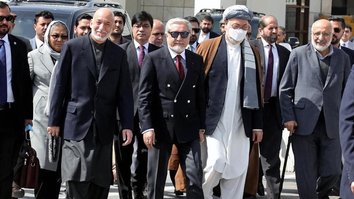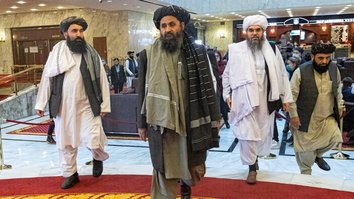MOSCOW -- To celebrate what the Kremlin calls 100 years of diplomatic ties between Russia and Afghanistan, Moscow Tuesday (May 28) hosted Afghan opposition politicians and representatives of the Taliban.
In a televised appearance at the start of the two-day meeting, Taliban political leader Mullah Abdul Ghani Baradar said the insurgents want an end to 18 years of conflict -- but would only sign a deal after foreign forces quit Afghanistan.
Baradar -- who helped the late Mullah Mohammad Omar found the Taliban -- was appointed its political chief in January following his release from a Pakistani prison.
The Taliban are "really committed to peace, but think the obstacle to peace should be removed first", he said in his first ever public media appearance. "The obstacle is the occupation of Afghanistan, and that should end."
![This AFPTV screen grab from a video made May 28 in Moscow shows a delegation of Taliban officials led by the group's chief negotiator, Mullah Abdul Ghani Baradar. [Nikolay Korzhov/AFP]](/cnmi_st/images/2019/05/29/18279-000_1h04v6-585_329.jpg)
This AFPTV screen grab from a video made May 28 in Moscow shows a delegation of Taliban officials led by the group's chief negotiator, Mullah Abdul Ghani Baradar. [Nikolay Korzhov/AFP]
The withdrawal of foreign troops from Afghanistan is a sticking point from which the Taliban have not budged since US-led peace talks started last autumn.
US Special Representative for Afghanistan Reconciliation Zalmay Khalilzad in negotiations with the Taliban has refused to agree on a timetable for troop withdrawal, a position the Afghan government fully supports.
"Peace requires agreement on four issues: counter-terrorism assurances, troop withdrawal, intra-Afghan dialogue and a comprehensive ceasefire," Khalilzad tweeted after "a marathon round of talks with the Taliban in Doha" in March.
History of hypocrisy
In an attempt to garner international clout as a peacemaker in Afghanistan, Russian leaders are supporting the Taliban's demands without conditions.
Russian Foreign Minister Sergey Lavrov welcomed the 14-member Taliban delegation to Moscow, even though their group is designated a terrorist organisation in Russia.
Russia and Afghanistan have "a shared aim -- fighting terrorism", he said, reiterating that Moscow supports a complete withdrawal of foreign forces.
"Russia is convinced that there is no military solution to the conflict in Afghanistan," he said, according to Radio Free Europe/Radio Liberty (RFE/RL). "The only possible way...is to achieve peace by political and diplomatic means."
The Kremlin, however, has a long history of supplying the Taliban with weapons and equipment in order to intensify the militants' war with the Afghan government and sabotage the peace process.
The Taliban continue to use those weapons without hesitation against Afghan civilians, officials and institutions.
Afghan officials said on May 28 that at least 23 members of the security forces were killed in two Taliban attacks targeting security checkpoints, one in Ghor Province and one in Logar Province, RFE/RL reported.
Circumventing the Afghan government
Tuesday's Moscow meeting once again cut out most senior members of President Ashraf Ghani's government, though the chairman of Afghanistan's High Peace Council and Afghan Ambassador to Russia Latif Bahand attended.
Afghan politicians and officials in attendance included former president Hamid Karzai; former warlord Atta Muhammad Noor; former Ghani national security adviser Muhammad Hanif Atmar, who is contesting the presidential election; and Afghan Ambassador to Pakistan Omar Zakhilwal, Radio Free Europe/Radio Liberty (RFE/RL) reported.
Two women were present, including lawmaker Fawzia Koofi.
The talks mark the second time Taliban leaders have met with Afghan figures in Russia, following a February summit that saw the former foes praying together and chatting over meals.
Noor, the former governor of Balkh Province, said he supports "having good relations with our brothers, with the Taliban".
"Let's step back a little, embrace each other and create conditions for the start of peace," he said, according to AFP.
In breach of democracy
Russia's "celebration" of diplomatic ties with Afghanistan, which included participation by an internationally recognised terrorist group and the Afghan government's main opposition, struck many observers as insulting.
"International rules and principles of diplomacy require that Russia invite the official representatives of the Afghan government to celebrate the 100th anniversary of its diplomatic relationship with Afghanistan," said Mohammad Daud Kalakani, a former member of the Wolesi Jirga (lower chamber of Afghanistan's parliament).
"Unfortunately, contrary to the expectations of the government and the people of Afghanistan ... Moscow violated diplomatic rules by inviting the Taliban terrorist group," he said.
"The Taliban are currently not recognised by any country or any international organisation," he said. "Inviting the group to Moscow means recognition of the Taliban terrorist group, and once again it proved to Afghans and to the international community that the Russians are the main supporter of the Taliban."
"Russia's invitation of the Taliban to a diplomatic meeting is in contradiction with the principles of diplomacy and international obligations," said Kabul-based political analyst Nabi Mesdaq.
"By ignoring the Afghan government in the first Moscow summit as well as in this one, Russians showed that they are no friend of the Afghans or their government but a friend and ally of the Taliban -- a group that takes innocent lives on a daily basis in its terrorist attacks," he said.
"By inviting the Taliban to Moscow, Russians granted the group political legitimacy and recognised its war and terrorist activities against the Afghan government and people," Mesdaq said.
"Inviting the Taliban to such meetings without the co-ordination and involvement of the Afghan government not only does not help the peace process but also makes the peace process more complicated," he said.
[Sulaiman from Kabul contributed to this report]

![Afghan Taliban chief negotiators Mullah Abdul Ghani Baradar (left) and Sher Mohammad Abbas Stanekzai (right) appear May 28 in Moscow during a conference marking a century of diplomatic relations between Afghanistan and Russia, followed by discussions with Afghan opposition politicians about the future of the country. [Nikolay Korzhov/AFP]](/cnmi_st/images/2019/05/29/18278-000_1h04v5-585_329.jpg)







It is a very good and detailed article that you have written in a sweet way in Pashto. Thanks to Salaam Times.
Reply1 Comment